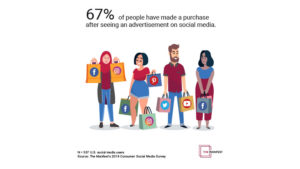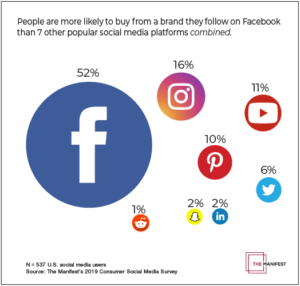
Consumers’ interactions with brands on social media influence their buying decisions — 67% of consumers have made a purchase after seeing an advertisement on social media. However, a new survey finds that not all platforms hold the same weight in people’s buying decisions.
People turn to Facebook more than any other social media platform to inform their buying decisions, suggests a new survey.
The study, from The Manifest, a business news and how-to website. This trend occurs even though anti-Facebook sentiment, such as the #DeleteFacebook movement, continues to gain momentum.
Consumers are more likely to make a purchase from a brand they follow on Facebook (52%), than on Instagram, YouTube, Pinterest, Twitter, LinkedIn, Snapchat, and Reddit combined (48%). Some digital marketing experts attribute this to Facebook’s status as the largest social network to date and its targeting algorithm.
“Facebook is a legacy social media platform that many generations go to, and the formatting of posts probably attracts those with a higher intent to purchase because it tends to feature long-form content,” said Andrew Clark, marketing strategist at Duckpin, a digital marketing agency.
Social media makes it easy for people and businesses to communicate and presents businesses with the opportunity to establish authentic connections with consumers. As a result, 67% of people have made a purchase after seeing an advertisement on social media.
“Social media makes people feel closer to a brand, and it makes people trust a brand,” said Scott Levy, CEO of Fuel Online, an SEO and digital marketing agency. “The whole idea is not to use social media as a selling platform but to provide value to people.”

Brands should cultivate a strong social media presence by creating advertisements and connecting with influencers. This can help them increase brand awareness and attract new customers. People Interact With Brands on Social Media In a Variety Ways, and They Expect Brands to Interact Back
While social media can be a powerful marketing and sales tool, it can also be key to providing high-quality customer service, which is critical to building customer loyalty. Most consumers interact with brands on social media by liking brands’ posts (51%), which doesn’t warrant a response.
But responding to those that leave reviews (31%), mention brands on their own profile (22%), direct message brands (20%), and tweet at brands (18%) could result in loyal customers.
“As much as social media serves as a marketing tool, it also equally serves as a customer service tool,” said Melissa Orozco, CEO of Yulu Public Relations agency in New York City.
Social media is an invaluable customer service and marketing tool; however, experts urge businesses to think critically about the platform they choose and their target audience while planning their social media strategy.
Source: The Manifest

You must be logged in to post a comment Login